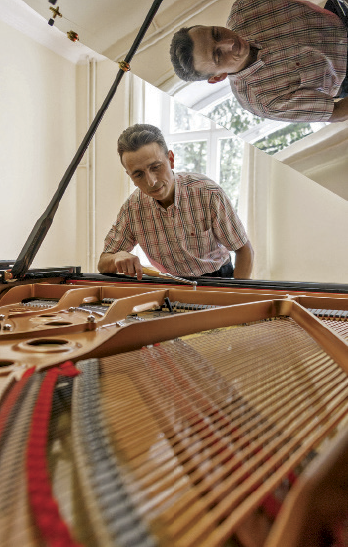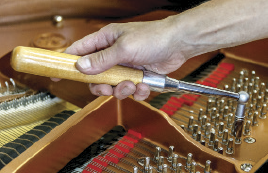If there were a Red Book of disappearing professions, a piano tuner, I’m sure, would be on its first pages. Today, piano masters can be counted on the fingers of one hand: even in Minsk, with its population of two million, there are barely 20 of them.

Andrey Ageenko restores and tunes musical instruments
The source of the ‘problem’ is not a lack of places where the skill can be taught; knowledge tends to be transferred by word of mouth, from master to master. Simply, technical progress has made the profession less in demand. Fewer people have pianos in their home, preferring electronic versions. Perhaps, in a few more years, there will be hardly any old-fashioned pianos — or tuners. However, Andrey Ageenko assures us that grand pianos won’t disappear, being respected for their ‘soul’. Nevertheless, playing ‘live’ music is a dying hobby.
Mr. Ageenko has worked at the Belarusian State Academy of Music for nine years as a tuner, caring for 18 instruments. Note by note, he brings each of the 80 keys to its peak, allowing the complicated mechanism to achieve its ultimate sound, via two hundred strings. A piano is just as complex as a car.
Like most tuners, Mr. Ageenko came to the profession from being a musician. He hadn’t originally planned to become a piano tuner but, in the late 1980s, while studying at the conservatoire, he bought a tuning key because his neighbours asked him to ‘help’ their instrument.
“I began tuning pianos as an amateur but soon had a lot of orders; at that time, about half of all homes had a piano. Before I realised it, my hobby had become a profession.”
A tuner needs patience, since a tuning key must be used accurately and with small movements. You not only tune the instrument but allow it to stay in tune. If a tuner isn’t experienced, the sound may change after just 5-6 playing sessions. Unsurprisingly, most pianists have their favourite tuners.
Piano masters frequently not only tune but restore instruments. Ideally, a piano should last 50 years before it needs to be retired. Professional musicians know that heat, damp and draughts harm the supersensitive mechanism and soundboards. Even a long trip or rough handling can damage a piano. Like people, a piano can become tired or wear out, and react badly to trauma or shock. Grand pianos and those in individual homes can suffer destinies as dramatic as those of their owners. If the pegs are broken, there’s no sense tuning the instrument. Repair can be expensive - $500 to $1,500 — so prevention is always a better course of action. Most home pianos need tuning at least once every six months. It can be costly to invite a tuner so people often leave it until their modest ‘Belarus’ or ‘Krasny Oktyabr’ piano needs either daily tuning, or restoration. In this case, it’s easier, of course, to buy a new instrument.

Andrey Ageenko restores and tunes musical instruments
Instruments dating from the late 19th and early 20th century are another matter, since it’s an honour to tune those. Mr. Ageenko once worked with such an instrument. He tells us, “I had a call and was asked to look at a ‘Kiev’ piano. I’d never seen one of these, so I was very interested. It was a wonderful late 19th century concert piano. I was surprised at the name because, as far as I know, such instruments were not produced in Ukraine. I opened the lid and found that the inside was German made! The lid of the keys was inscribed ‘Kiev’, but had been taken from other instrument; probably, it had been ‘remade’ several times. Restoration took almost six months, and the result surpassed all my expectations.”
Tuner-restorers at musical colleges don’t earn too much for their labours, so it’s accepted that they take work ‘on the side’. Of course, those at the top of their profession, tuning world famous Steinway & Sons pianos, can earn 200 Euros an hour.
Among those working as a tuner are hereditary masters and the self-educated. Gennady Chernyavsky comes from a family of tuners; from 1963, his father, Stanislav Matveevich, worked as the main musical ‘doctor’ for the Czech Rieger-Kloss organ at the Belarusian State Philharmonic Society. Today, his son Gennady continues his business, tuning not only organs but pianos. Gennady admits, smiling, “I learnt by watching my father. Like him, I lacked a formal musical education. First, he checked my ear for music. It appeared that I had a good ear, so I decided to develop this further.”
After his time in the army, Chernyavsky-junior took a year working as a tuner of the conservatory piano. He was then invited to service that in the chamber hall of the Belarusian State Philharmonic Society, although he first trained on Czech pianos, studying the subtleties of their manufacture. He doesn’t think his profession unusual, simply shrugging his shoulders at the idea.
Gennady’s father has passed on almost 30 years of work to his son. However, at present, the younger Chernyavsky isn’t keen on family business, although he doesn’t help out. If electronic ‘Yamahas’ don`t completely force out their huge primogenitors, the Chernyavsky creative dynasty will, probably, continue.
MT’s reference:
In much earlier days, there were no professional keyboard tuners, as instruments had only five octaves. Musicians and composers could tune them independently. Over time, piano structures became complicated, requiring instrument tuning to be based on more knowledge.











